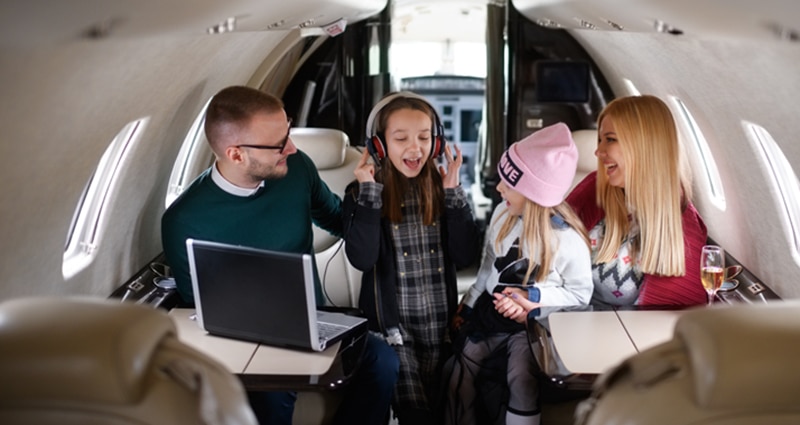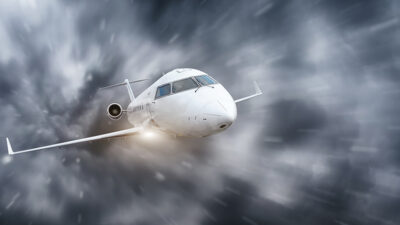Are You Prepared When Traveling With Children Onboard?

A recent article in Travel + Leisure provided interesting statistics about how many children are flying on private flights. As many as 15-25% of flights from large charter companies have children onboard.
Pre-travel medical advice is not always available for children like it is for adults. Parents and clinicians should work together to ensure that young travelers are safe and as comfortable as possible on flights.
Adults traveling with children should consider completing a course in basic first aid or CPR before taking a flight. This can include the crew and other guests, as well as the parents. Medical training and CPR for children are a part of MedAire’s Management of In-Flight Illness and Injury training. Parents should assess all anticipated travel-related activities with the help of MedAire’s Global Response Centre and their physician.
According to MedAire’s MedLink Emergency Response Centre – which handles 300 in-flight calls a day from commercial and corporate aircraft – two out of every 10 calls involves a child under 12 years of age. The most common emergencies are fever, febrile seizures (seizures caused by high fever in very young children), vomiting, allergy symptoms due to an allergic reaction and medical events related to a pre-existing medical condition. Other commonly reported health problems among child travelers are diarrhea, dermatologic conditions (animal and arthropod bites), sunburn, fever from malaria and respiratory disorders.
Traveling with infants can be a challenge in many ways. One of the most significant issues is that their immune systems are still developing and air travel can increase their risk of catching infectious diseases. Changes in schedules, activities and environment can be stressful for children and infants, suppressing their ability to fight germs and making them more susceptible to illness. For children and infants with chronic illnesses, it is recommended that parents talk with their pediatrician regarding timing and itinerary.
Your Family’s Pre-Flight Health Checklist
To help prepare for your trip, contact your ground-based medical provider, like MedAire’s Global Response Centre, for advice on traveling with your child and information about the conditions at your destination. This includes:
- Recommendations for hospitals with pediatric specialties or capabilities
- Information on whether on-location medical services can be utilized or if the child will need to be evacuated
- Destination-appropriate vaccinations to minimize the risk of malaria, intestinal parasites, and TB (tuberculosis)
- Recommendations for necessary legal documentation including custody papers, birth certificates, passports, etc.
Aircraft owners and operators should also ask about MedAire’s Pediatric Medical Kit, which contains commonly used medications in lower dosage sublingual or liquid form appropriate for children.
Reduce Risk and Increase Comfort
Do the following to help ensure that your child has a happy, healthy flying experience:
- Visit your child’s doctor to ensure that routine vaccinations are up to date. If the child has a pre-existing medical condition, obtain a clinician’s approval to travel and any specific instructions related to the condition.
- Wash your hands frequently, and avoid contact with unwell travelers if possible.
- Cabin pressure changes can cause temporary changes in the middle ear pressure which may produce ear pain. Offer an infant a pacifier, bottle or breastfeed during takeoff and descent to help equalize the pressure in its ears.
- Teach older children that the Valsalva maneuver (pinching the nose and blowing), yawning, swallowing or chewing can help relieve inner ear pressure.
- Consider using noise-cancelling headphones, small earplugs or cotton balls to reduce the noise level so your infant can nap. Minimizing noise also helps reduce fatigue.
- Use FAA-recommended child seats during a flight as turbulence may place your infant at risk for injury if they are sitting on a parent’s lap.
- Although it is tempting to give your child over-the-counter medication pre-flight to assist with sleeping, this is not recommended as drugs such as diphenhydramine (Benadryl) may have the opposite effect.
Advice Related to Pre-Existing Conditions
Certain pre-existing medical conditions can create unique challenges when traveling. Below are some key considerations to keep in mind:
- Epilepsy. The seizure threshold may be lowered by travel-related issues including jet lag, delayed meals, potential hypoxia and fatigue. These factors may place a child at risk for increased seizure activity.
- Type 1 diabetes. Keep in mind how traveling across time zones may impact the amount of insulin needed on flights.
- Food allergies. Make the flight crew aware of special food needs well in advance of a flight if possible. Indicate the severity of the allergy to each type of food. Carry an EpiPen and antihistamines with you when you travel.
- Sickle cell anemia. This condition can pose a risk due to reduced oxygen pressure in the cabin. Consult your child’s clinician before traveling.
- Feeding tubes and infusion tubes. These devices should be capped prior to takeoff and landing due to cabin pressure changes and gas expansion.
- Bone fractures. If a broken bone is newly casted in fiberglass or plastic within 48 hours of a flight, it should be bivalved (i.e. cut in half) to prevent pain and circulatory issues due to trapped air beneath a cast, which may expand during flight.
By getting the medical advice and supplies needed to prepare for a health challenge or to deal with a pre-existing condition before a flight, adults can help ensure that children have a safe and comfortable trip.

Flight departments around the world rely on MedAire, an International SOS company, to reduce their travel safety risks. Crews are trained on the resources to manage in-flight illness and injury with onboard medical equipment and telemedicine assistance. On the ground, passengers and crew have one resource for medical referrals; guaranteed payments for medical expenses; assistance with lost documents and prescriptions; online and e-mail travel advisories; evacuation support and a host of other services.
http://www.medaire.com/
© 2024 MedAire, Inc.. All Rights Reserved.
Next ArticleRelated Posts

Peer Support Programs: Transforming How Aviation Addresses Mental Health
While the industry has evolved in acknowledging these issues, stigma still impedes many from seeking available resources. Here, the significance of Peer Support Programs (PSPs) has been increasingly recognized. These initiatives offer a confidential haven where concerns can be openly discussed, free from judgment.

Understanding the Challenge of Turbulence-Related Injuries in Business Aviation
The challenge of managing air turbulence in business and private aviation is becoming increasingly evident due to the growing number of turbulence-related incidents affecting aircraft operators across the industry.

